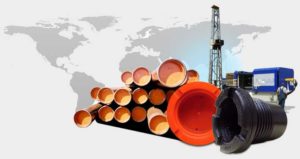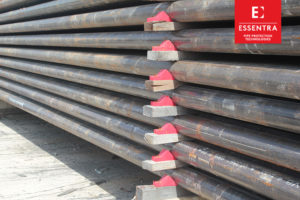Drill pipes are essential in the oil and gas industry, and maintaining their integrity is critical for safe and efficient operations. Regular pipe inspection and maintenance ensure that these pipelines remain in optimal condition, reducing the risk of failure and extending their lifespan.
Essential Techniques for Effective Pipe Inspection and Drill Pipe Maintenance
From non-destructive testing methods to routine cleaning and lubrication, the right approach to pipe care can make all the difference in preventing unexpected downtime and equipment damage. Let’s explore the most effective practices for maintaining drill pipe performance.
1. Visual Inspection
The first step in any maintenance routine is a thorough visual pipe inspection. This process involves checking the pipe for visible wear, damage, or corrosion. Inspectors should look for cracks, pitting, and other irregularities on the pipe surface.
It’s also essential to check the weld seams and joints for signs of fatigue or failure. Visual pipe inspection, while basic, is a crucial step in identifying issues before they become critical problems.
2. Non-Destructive Testing (NDT)
While visual pipe inspection is essential, it cannot detect all defects. Non-destructive testing (NDT) methods, such as ultrasonic testing, magnetic particle testing, and dye penetrant inspection, identify internal and surface defects without damaging the pipe. These methods provide a deeper understanding of the pipe’s condition, ensuring that any hidden issues are detected and addressed promptly.
3. Thread Inspection
The threads on a drill pipe are crucial for maintaining a secure connection between pipe sections. The threads are regularly inspected to ensure they are free from wear, deformation, and damage.
This can be done using thread gauges and other specialized tools to measure thread dimensions and ensure they meet industry standards. Proper thread inspection helps prevent leaks and connection failures during drilling operations.
4. Hardbanding Inspection
Hardbanding is a protective layer applied to the drill pipe to reduce wear and extend its life. Regular inspection is crucial to ensure it is intact and effective. Over time, hardbanding can wear down, leading to increased friction and damage to the pipe and the wellbore. Inspectors should check the thickness and integrity of the hardbanding and reapply it as necessary to maintain its protective properties.
5. Measurement and Calibration
Accurate measurement and calibration are vital for maintaining the integrity of drill pipes. Regularly measuring the pipe’s dimensions, such as its diameter, wall thickness, and length, ensures that it meets the required specifications.
Measuring tools and equipment should also be calibrated periodically to ensure accuracy. This helps identify deviations from the standard that could compromise the pipe’s performance.
6. Cleaning
Keeping drill pipes clean is essential for preventing corrosion and other forms of damage. Regular cleaning removes mud, debris, and other contaminants that can cause wear and tear.
This process can be done using high-pressure water jets, brushes, and other cleaning tools. Ensuring the pipes are thoroughly cleaned before pipe inspection and maintenance activities can significantly improve their accuracy and effectiveness.
7. Lubrication
Lubrication is essential for reducing friction and wear on drill pipes during use. Regularly applying the appropriate lubricants to the threads and other moving parts helps maintain their condition and extends their lifespan. Using high-quality lubricants suitable for specific operating conditions is crucial for effective maintenance.
8. Storage
Proper storage of drill pipes is critical to prevent damage and ensure longevity. Pipes should be stored in a dry, well-ventilated area, away from direct sunlight and harsh environmental conditions. Using pipe racks and supports helps prevent bending and deformation. Storing pipes horizontally or at a slight angle is also essential to prevent moisture accumulation inside the pipes.
9. Record Keeping
Maintaining detailed records of all inspection and maintenance activities is crucial for effective drill pipe management. This includes recording the results of visual inspections, NDT, thread inspections, and any repairs or replacements. Detailed records help track the condition of each pipe, plan maintenance activities, and ensure compliance with industry standards and regulations.
10. Repair and Replacement
When defects or damage are identified during inspection, timely repair and replacement are crucial to maintaining the integrity of the drill pipe. This can involve welding, re-threading, or replacing damaged sections of the pipe.
Using high-quality materials and following industry-standard repair procedures ensures effective and durable repairs. Regularly replacing worn or damaged pipes is also essential to maintaining the overall safety and efficiency of drilling operations.
Master Pipe Inspection for Optimal Performance!
Regular and thorough pipe inspection and maintenance are vital for ensuring the safety and efficiency of your operations. By incorporating these top techniques into your maintenance routine, you can prevent failures, extend the life of your equipment, and ensure smooth and safe operations.
At MSI Pipe Protection Technologies, we offer expert guidance and top-quality products to meet your specific needs. Call us today!




